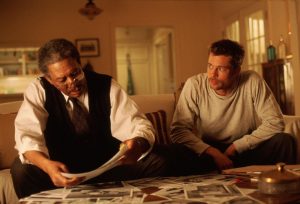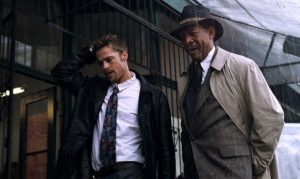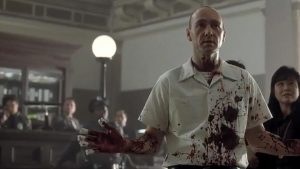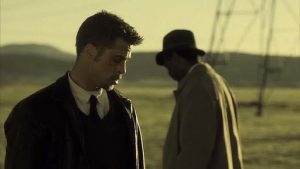Seven (1995)

Seven (1995), directed by David Fincher, is a landmark in the crime thriller genre, blending elements of noir, psychological horror, and mystery into a dark, brooding narrative about the nature of evil. With a script by Andrew Kevin Walker, the film explores the moral and philosophical dimensions of crime through the lens of a murder investigation that gradually descends into a nightmarish meditation on sin, justice, and human depravity. Anchored by powerful performances from Morgan Freeman, Brad Pitt, and Kevin Spacey, Seven is both a brutal and thought-provoking experience that has left a lasting impact on audiences and the genre itself.
Suggested videos for you:
Plot Overview
The story follows two detectives in an unnamed, perpetually rain-soaked and decaying city. Detective William Somerset (Morgan Freeman), a seasoned and world-weary veteran, is on the verge of retirement. As he prepares to leave his bleak surroundings behind, he is paired with the hotheaded and idealistic Detective David Mills (Brad Pitt), who has recently transferred to the city with his wife, Tracy (Gwyneth Paltrow).
Somerset is reluctant to take on another case in his final days, but the two detectives quickly find themselves investigating a series of grotesque murders, each designed to reflect one of the seven deadly sins: gluttony, greed, sloth, lust, pride, envy, and wrath. The murderer, later revealed to be John Doe (Kevin Spacey), believes he is delivering divine punishment to individuals who embody these sins.
The investigation becomes a grueling race against time as Doe’s crimes grow increasingly elaborate and disturbing. Somerset and Mills are not only forced to confront the horrors of the crimes but also their own moral compasses as they dive deeper into the killer’s twisted logic. The film builds to its unforgettable climax when John Doe turns himself in, leading the detectives to a final, devastating revelation about the nature of sin and justice.
Themes and Philosophical Underpinnings
Seven is, at its core, a meditation on the nature of evil, morality, and the human condition. The seven deadly sins serve as a framework for John Doe’s killings, but the film goes far beyond a simple murder mystery. Each victim, while seemingly chosen for their sinful ways, represents broader societal issues, raising the question of whether the sins themselves are inherent human flaws or the result of the corrupt world around them.
Detective Somerset, who represents the film’s moral conscience, is a character deeply affected by the overwhelming darkness he has witnessed throughout his career. His cynicism and despair over the state of humanity are palpable, and his constant search for meaning reflects his inner conflict between caring about justice and realizing its futility in a world that seems indifferent to suffering. Somerset’s quiet reflection on the nature of evil contrasts sharply with Mills’ youthful, untested sense of righteousness. Mills is eager to believe that good can triumph over evil if one fights hard enough, but his inexperience makes him susceptible to John Doe’s manipulations.
The film’s most striking philosophical thread is embodied in John Doe’s character. Played with chilling calmness by Kevin Spacey, Doe sees himself not as a simple murderer but as an agent of divine justice. He believes that the world is so consumed by sin that extreme measures must be taken to wake people up to their moral decay. His crimes, while horrifying, are carefully crafted to make a point about each sin, and the audience is left to grapple with the uneasy notion that, in some twisted way, Doe’s worldview holds a mirror to society’s own excesses and moral failures.
The final twist, in which John Doe reveals that he has orchestrated the ultimate sin—envy—by killing Mills’ wife, Tracy, and provoking Mills to commit wrath by killing him, forces both the characters and the audience to question their own moral boundaries. The bleakness of the ending reinforces the idea that, in this world, justice may be impossible, and evil may not only persist but consume those who attempt to fight it.
Performances
The performances in Seven are exceptional across the board. Morgan Freeman delivers a restrained, introspective portrayal of Somerset, a detective who is deeply aware of the futility of his work yet compelled to finish the case. Freeman imbues the character with a quiet dignity and deep sadness, reflecting the burden of a lifetime spent witnessing the worst of humanity.
Brad Pitt, as Detective Mills, brings a raw, energetic intensity to the role. Mills is a man driven by a desire to make a difference, but as the investigation progresses, we see how his optimism and sense of justice are slowly eroded by the horrors he faces. Pitt’s emotional range is most apparent in the film’s devastating final sequence, where Mills is confronted with the unimaginable consequences of his pursuit of justice. His anguish and helplessness in this moment are palpable, making the final act all the more impactful.
Kevin Spacey’s portrayal of John Doe is unforgettable. Spacey brings a calm, almost philosophical detachment to the role, making Doe’s evil all the more terrifying. His quiet, calculated demeanor contrasts sharply with the grotesque nature of his crimes, and his monologue about why he has committed the murders serves as the film’s dark moral core. Doe’s belief that he is teaching the world a lesson about sin adds a layer of complexity to what could have been a one-dimensional villain.
Gwyneth Paltrow, while having limited screen time as Tracy Mills, provides a crucial emotional anchor to the story. Her scenes with Freeman’s Somerset offer glimpses of the vulnerability and innocence that will be tragically destroyed by the film’s end.
Direction, Cinematography, and Score
David Fincher’s direction is masterful in its use of atmosphere and tension. The world he creates is bleak, oppressive, and devoid of hope. The unnamed city is almost a character in itself, with its constant rain, darkness, and decay reflecting the moral rot at the center of the story. Fincher’s meticulous attention to detail is evident in every frame, from the grimy streets to the claustrophobic interiors of the crime scenes.
Darius Khondji’s cinematography adds to the film’s foreboding atmosphere. The use of shadows, muted colors, and low lighting reinforces the sense of dread that permeates the narrative. The rain-soaked streets, the dimly lit apartments, and the decaying buildings all serve to create a world that feels inescapably corrupt and doomed.
Howard Shore’s haunting score further amplifies the tension, using minimalist, discordant tones to underscore the sense of unease. The music never overwhelms the action but instead lingers in the background, creating an almost suffocating sense of dread.
Conclusion
Seven is a haunting, unflinching exploration of evil and the human condition. With its intelligent script, unforgettable performances, and atmospheric direction, the film transcends the crime thriller genre to become a philosophical examination of morality, justice, and the inevitability of sin. The final scenes of the movie, where John Doe completes his “masterpiece” by manipulating Mills into committing wrath, are among the most powerful and devastating in modern cinema.
Fincher’s dark, uncompromising vision leaves viewers with no easy answers, only an overwhelming sense of the fragility of morality in the face of overwhelming evil. Seven is not just a film about catching a killer; it’s about confronting the darkest parts of human nature and realizing that, sometimes, the line between good and evil is far more blurred than we’d like to believe.










